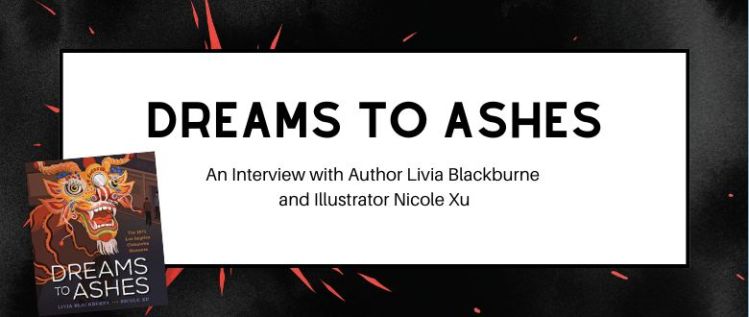Notes from a Sickbed: An Interview with Author Tessa Brunton

In 2009, Tessa Brunton experienced the first symptoms of myalgic encephalomyelitis (also known as chronic fatigue syndrome). Notes from a Sickbed recalls the next eight years of her life—largely housebound—with honesty, a pointed wit, and a lively visual imagination.
Today Tessa joins us to reveal her inspiration for the book, why she doesn’t shy away from dark humor, her favorite comic collection, and more! And read on to watch a video introduction from our YouTube channel.

What was your inspiration for the book?
I love Lynda Barry’s book “One! Hundred! Demons!,” which is a collection of short comics she made about memories that haunt her, and after rereading it I started writing little notes and doodling some of my “demons” from this illness, like the envy or bitterness I was feeling. I often felt like I had to stay upbeat about the illness or risk making other people uncomfortable, so it was liberating to find a way to be honest about how I felt about my situation.
In the book you use a lot of humor and fantasy when discussing sadness, loss and frustration. Were you afraid of making your comics too sad?
I lean on dark humor a lot when dealing with difficult experiences, so when I was going through something hard with the illness, like a lengthy isolation or trouble finding work I could do with my symptoms, a lot of the notes I wrote down had humor and fantasy baked right in. I wanted to stay true to the spirit of that when I translated the notes into comics.
What’s your favorite comic in the collection and why?
Definitely the comic about the year I lived in an apartment under some really lively, happy-go-lucky college girls. It was a year where my symptoms were terrible and I would go through long periods of being housebound, meanwhile they were having parties. It was not the best soundtrack for me. I found it really satisfying to make fun of the whole situation.
Your comics look like they took a long time to make. Did working on them get tedious?
My process for each page is probably five steps longer than it should be. There’s writing a rough outline of the comic, then sketching, scanning the sketches, digitally penciling over the sketches on an iPad, then tracing the pencils from an iPad screen onto tracing paper, and then tracing that onto watercolor paper and then finally ink washing. I won’t lie, it could get tedious, but luckily I’d subscribed to a lot of good podcasts.

In the book you talk about how your illness kept you from a lot of activities like making art, so how were you able to make these comics?
When I started writing the notes that I would eventually turn into the comics for this book, I was too sick to make this many long, highly-detailed comics. A few years ago I discovered a new symptom management strategy that other people with my disease had developed and shared online. The strategy doesn’t work for everyone, but by copying their methods I began to improve. However, the strategy is also very time consuming and isolating, so even though my symptoms were improving, I was spending days and sometimes weeks alone, waiting. The first time I tried it my partner gave me a giant fantasy novel so I could keep myself entertained, but I got bored with that book and instead began trying to turn the notes I’d written into longer comics.
Why does the collection focus on the six years you were sick before you were diagnosed?
A fellow chronically ill person pointed out to me that often the sick people who get to tell their stories are the ones who’ve experienced some improvement or a full recovery. Maybe because of that, during the first years of my illness I saw few stories (if any?) that reflected my experience, which was not an illness and recovery story, or even a story where there was a patient community and support from doctors, but a long-term illness that had a serious impact on quality life and had no diagnosis and no treatment.
I found it demoralizing, and I think not having a reference point for this kind of situation in a movie or some cultural background made it harder for people around me to understand what my life was like. So, for this book I wanted to make something that I would have appreciated during those six years. Also, six years is a long time, so I had a lot of notes from that era.
What were you eventually diagnosed with?
Myalgic encephalomyelitis, which is also sometimes called Chronic Fatigue Syndrome or ME/CFS. It’s a disease that’s a not very well understood or well known, so getting a diagnosis didn’t immediately shed light on my situation for me or the people around me. I still have to explain what ME/CFS is to people. However, ME/CFS actually has a lot of similarities with long COVID and there’s speculation and that the conditions overlap and new research that’s investigating the connection, so ME/CFS has been getting more attention lately.
Watch this video introduction
Praise for Notes from a Sickbed
★”Painfully real.” –starred, Kirkus Reviews
“Brunton’s art is distinct and emotionally evocative . . . The memoir achieves its mission to communicate to readers the isolation of chronic illness.”—Booklist
“Notes from a Sickbed is a sympathetic, inspiring graphic memoir account of grappling with an illness.”—Foreword Reviews
“[A]lternates whip-smart humor with searing emotional honesty . . . a revelatory look into one person’s experience managing a chronic condition.”—Publishers Weekly
“An incredibly authentic and honest look at life with a chronic illness.”—School Library Journal
Connect with the author

Tessa Brunton is an cartoonist and author based in Santa Cruz, California. Her first comic book Passage was nominated for two Ignatz Awards: Outstanding Comic and Promising New Talent. Her mini-comic Second Banana is a Best American Comics 2014 notable comic. Her comics have appeared in Bitch Magazine, Maisonneuve Magazine, The Comics Journal, and many anthologies.
Find more author and illustrator interviews on the Lerner blog!


Comments